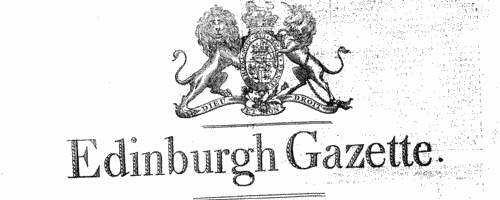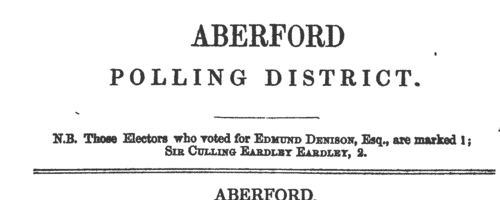Hield Surname Ancestry ResultsOur indexes 1000-1999 include entries for the spelling 'hield'. In the period you have requested, we have the following 35 records (displaying 1 to 10): Single Surname Subscription | | | Buying all 35 results of this search individually would cost £172.00. But you can have free access to all 35 records for a year, to view, to save and print, for £100. Save £72.00. More... |
These sample scans are from the original record. You will get scans of the full pages or articles where the surname you searched for has been found. Your web browser may prevent the sample windows from opening; in this case please change your browser settings to allow pop-up windows from this site. York Will Calendar
(1660-1665)
The diocese of York comprised most of Yorkshire, and Nottinghamshire: the York Exchequer court was the ordinary probate jurisdiction for the Yorkshire part of the diocese, but some wills from Nottinghamshire and other parts of the province of York were also proved there. Dr Francis Collins compiled this index to the wills in the York registry proved from 1660 to 1665. The date of the probate precedes the name of the testator: during the period covered by the volume the dates of probate are very rarely given in the registers - they were therefore supplied from the Act Books. However, the Act Book for Ainsty, City and Craven deaneries is missing for this period, and in those cases no date could be given. In a very few instances (marked with an asterisk) in these deaneries in which the date has been supplied it has been taken from the registers. Additional matter from the Act Books is given within square brackets. Testators' names are given in full, surname first; then parish or place of abode, and in some cases occupation; then date of the will itself; and volume and folio number in the probate register. Where a place of burial, or intended burial, was indicated, that is also added, with the word 'bur.', within round brackets. All wills between 1652 and 1660 were proved in London; in practice, many Yorkshire wills had remained unproved at the date that the York Exchequer probate court was restored, and so there is in this list a large number of wills dating back through the 1650s.HIELD. Cost: £2.00.  | Sample scan, click to enlarge

|  Masters of Apprentices registered at York
(1712-1713) Masters of Apprentices registered at York
(1712-1713)
Apprenticeship indentures and clerks' articles were subject to a 6d or 12d per pound stamp duty: the registers of the payments usually give the master's trade, address, and occupation, and the apprentice's father's name and address, as well as details of the date and length of the apprenticeship. There are central registers for collections of the stamp duty in London, as well as returns from collectors in the provinces. These collectors generally received duty just from their own county, but sometimes from further afield. January 1712 to June 1713. (The sample entry shown on this scan is taken from a Norfolk return)HIELD. Cost: £8.00.  | Sample scan, click to enlarge

| Tradesmen of York
(1559-1759)
No man or woman could trade in the city of York without having obtained 'freedom' of the city. Their names were recorded on the 'Freemen's Roll', or Register of the Freemen of the City of York, which contains about 16,600 names for this period. A list of names was prepared for each year. Each annual list starts with the name of the mayor and the camerarii or chamberlains. The chamberlains were freemen charged with the duty of receiving the fees of the new freemen; of seeing that only freemen traded in the city; and of preparing this roll, which was compiled from the names on their own account books from the receipts for the fees. There are three groups of freemen: those who obtained freedom after serving out an apprenticeship to a freeman; the children of freemen (per patres); and a handful who claimed freedom by 'redemption', i. e. by purchase or gift from the Mayor and Court of Aldermen.
HIELD. Cost: £2.00.  | Sample scan, click to enlarge

| Tradesmen of Chester
(1392-1805)
Lists of admissions of freemen of the city of Chester from the earliest surviving records to 1805 were compiled by J. H. E. Bennett and published by the Lancashire and Cheshire Record Society from 1906. These lists were extracted from the mayoral yearbooks (dating back to 1392) and twelve freemen's rolls covering 1538 to 1612 and 1636 to 1805; and a list of admissions for 1505-1506 in Harleian MS 2105 (British Library). The record does not become more or less continuous until about 1490: in all, 12,426 freedoms are recorded. Freedom of the city, necessary to practise a trade in the city, could be obtained by birth (in which case the father's name and occupation are usually given); by apprenticeship to a freeman (the master's name and occupation being given); or by order of assembly. Both the freemen and the masters listed are indexed here. The main abbreviations used are: B, freedom taken up by right of birth; I, freedom taken up by right of indenture; M. B., Mayor's Book; *, freedom granted by order of assembly.HIELD. Cost: £4.00.  | Sample scan, click to enlarge

| Army officials and clerks
(1805)
Officials and clerks of the War Office in Whitehall, the Army Pay Office in Whitehall, the Ordnance in Palace Yard, the Royal Military Academy at Woolwich, the Royal Elaboratory at Woolwich, the Artillery, Officers at Out Ports and Garrisons (in Britain, Guernsey, Jersey, the Isle of Man, Gibraltar, Jamaica, St Christophers, Antigua, Dominica, Quebec, St Vincents, Barbadoes, Halifax (Nova Scotia), New Brunswick, St John's (Newfoundland), Annapolis, Trinidad, the Bahamas, and Bermuda), the Corps of Royal Engineers, his Majesty's Mint, the Commissary's Department to the Field Train, the Commander-in-Chief's Office in Whitehall, the Commissary-General's Office of Musters in Whitehall, the Commissary-General's Office of Stores at 35 George Street in Westminster, the War Department in Downing Street, and the Army Agents are listed in Holden's Triennial Directory of 1805 to 1807.HIELD. Cost: £8.00.  | Sample scan, click to enlarge

| Deaths
(1808)
The European Magazine was published monthly in London; volumes 53 and 54 cover January to December 1808. There was nothing particularly European about the contents, which relate mainly to English affairs. Each month's issue contained a section of birth, marriage and death notices. This is the index to the deaths.HIELD. Cost: £6.00.  | Sample scan, click to enlarge

| Ordnance Staff: Bahamas
(1809)
'An Account of the Establishment of the Office of Ordnance, as it stood at Midsummer 1809; with the Names of the Persons holding the several Offices; and the Salaries or Emoluments arising therefrom.' The return is set out in tabular form, on facing pages, giving: office; full name (or occasionally surname and initials); salaries and emoluments by His Majesty's warrant or by order of the Master-General and Board of the Ordnance - with separate columns for salaries by quarter books, by bill and debenture, and gratuities, house rent, coals and candles, stationery allowance, and pay of assistant clerks at the Tower and Pall Mall.HIELD. Cost: £6.00.  | Sample scan, click to enlarge

| Officers of the 2nd West India Regiment
(1820)
The War Office issued regular notices of promotions and appointments within the British Army, and these were published in the Edinburgh Gazette. Full names of these officers are given, as well as the surnames of those whose places they filled because of promotion, resignation, death, dismissal or exchange. January to December 1820.HIELD. Cost: £6.00.  | Sample scan, click to enlarge

| Bahamas Slave Owners (1838)
Slavery was abolished throughout the British Empire by act of Parliament in 1833. This list, published in 1838, gives details of compensation paid to owners who had suffered by the emancipation of their slaves after abolition. The table gives the date of the award, the number of the claim, the full name of the party to whom payment was awarded, the number of slaves, and the sum paid. Few masters had owned more than 100 slaves; most of the claimants had only a few. The cost of the loss of a single slave was generally assessed here at £13-£17. There were 1100 claims from Bahamas, including some that were abandoned, disallowed, or still unsettled because of litigation.
HIELD. Cost: £8.00.  | Sample scan, click to enlarge

| Electors for Leeds
(1848)
On 14 and 15 December 1848 an election took place for a Knight of the Shire for the West Riding of Yorkshire in the House of Commons. The candidates were Edmund Denison and sir Culling Eardley Eardley, gaining 14,743 and 11,795 votes respectively. The county franchise at this period included freeholders of land worth 40s or more a year; £10 copyholders and long-leaseholders; and £50 short-leaseholders and tenants. This poll book was published in 1849.
Former poll books had been compiled from the sheriff's returns; but as these were now transmitted to the Home Office immediately after an election, in this instance the polling was marked from the check-clerk's returns, carefully compared with the registers marked in the poll booths at the time of voting.
The votes for the respective candidates are indicated by the numerals 1 (Denison) and 2 (Eardley). The omission of these numerals indicates that the elector did not vote. Many names which appear on the register of particular townships are completely omitted in this poll book: in all these cases, the same name will be found recorded in some other township, the elector having two or more qualifications. In such cases, his name only appears in the poll book in the actual township for which he chose to vote; or, if he did not vote at all, in that township for which he was qualified that lay closest to his actual residence.
The townships are arranged alphabetically within polling district; and within each township the names are arranged alphabetically by surname and christian name, and the elector's residence is given. Many of the electors resided outside the township for which they were qualified - some in other counties. Moreover, at the end of each polling district there is a list of persons registered to poll in that district, from townships is other districts. HIELD. Cost: £6.00.  | Sample scan, click to enlarge

|
Research your ancestry, family history, genealogy and one-name study by direct access to original records and archives indexed by surname.
|













